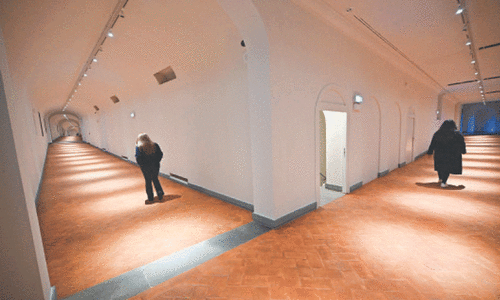NEW DELHI: India extended its coronavirus lockdown until the end of May on Sunday as it reported its biggest single-day jump in cases, but said some sectors would be permitted to open up to ease the economic pain.
The lockdown affecting 1.3 billion people has been in force since late March and has been devastating for India’s poor, with millions of migrant workers losing their jobs.
“Lockdown measures to contain the spread of Covid-19 will continue” until at least May 31, the home affairs ministry said in a statement.
Schools, places of worship, shopping malls, cinemas and gyms must remain closed, the ministry said, and bans on large gatherings for religious and sporting events will be extended.
City metro train services and domestic and international air travel will remain suspended, it said. A night curfew restricting public movement, except for essential services, will be kept in place between 7pm and 7am.
Restaurants however will now be allowed to operate their kitchens for takeaway services. Sports complexes and stadiums are permitted to host events — but without spectators.
Inter-state and intra-state buses and passenger vehicles were authorised to operate, but with the discretion of states and territories.
The National Disaster Management Authority said the restrictions would be updated “as necessary, keeping in view the need to open up economic activities” in Asia’s third-biggest economy while containing the virus.
“India will not see the worst of Covid-19, like in other countries,” Health Minister Harsh Vardhan tweeted, adding that state governments had the flexibility to implement locally tailored measures.
Cases on the rise
The third extension to the lockdown came as India recorded its biggest single-day jump in cases with 4,987 new infections in the last 24 hours. It took the total number of cases to 90,927 with 2,872 deaths.
Health experts say infections may only peak in June or July, and have called for more testing to determine the spread of the disease.
Earlier on Sunday, India’s worst-affected coronavirus state Maharashtra, home to the financial capital Mumbai, extended its lockdown to end-May ahead of the national announcement.
Maharashtra, with a population of 112 million, has reported 30,706 cases including 1,135 deaths. Mumbai — India’s worst-hit city — has 18,555 infections, and the pandemic has pushed its hospitals to breaking point.
A city authority spokesman said Mumbai was considering turning Wankhede Stadium — the site of India’s cricket World Cup final triumph in 2011 — into a virus treatment facility.
The conversion could happen if other facilities get overwhelmed with the onset of the monsoon, which usually starts around mid-June — and monsoon-related illnesses, although “nothing has been decided yet”, the spokesman said.
There were some nationwide relaxations for industry and agriculture last month, while offices last week were allowed to operate with one-third capacity.
Limited service resumed on Tuesday on the country’s massive rail network.
The dire economic situation has sparked a migrant worker crisis, as many businesses shut down when the lockdown was imposed.
Jobless and hungry, many migrants fled the cities, some walking hundreds of kilometres. Dozens have lost their lives to accidents or exhaustion.
Some of those stranded in urban areas have also clashed with police in a recent spate of protests as they clamoured to be allowed to return home to their villages.
On Sunday, five policemen and a journalist were injured in Rajkot city of western Gujarat state after up to 3,000 migrant workers clashed with officers when a special train to bring them home was cancelled. Twenty-nine people were arrested.
Finance Minister Nirmala Sitharaman this week announced several stimulus measures, although analysts said they focused on easing the supply side of the economy.
“Near to medium-term growth prospects remain weak in the absence of demand boosts,” Kotak Mahindra Bank senior economist Upasna Bhardwaj said in a note.
Published in Dawn, May 18th, 2020














































Dear visitor, the comments section is undergoing an overhaul and will return soon.